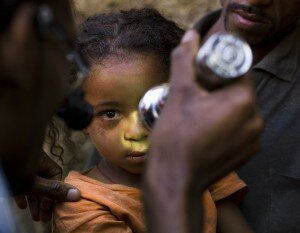
A child in the Amhara region of Ethiopia takes the liquid form of Zithromax® during MalTra Week in November. Photo by Yen Kim for ITI.
By Colin L. Beckwith, Deputy Director of ITI
DURBETE, Ethiopia – Twice a year, millions of people in Ethiopia line up in hundreds of towns and villages to be treated for trachoma in Amhara, the most endemic region of this East African country. It happens once a year in western Amhara, and once in eastern Amhara. The goal is for every person to get the antibiotic Zithromax® donated by Pfizer to treat and prevent trachoma, an eye infection that can lead to blindness. At the same time, each person with fever is screened for malaria, and treated if needed; hence the campaign is called MalTra Week.
Recently, two ITI staff members – Logistics Coordinator Yen Kim and I — traveled to Ethiopia to watch the scene unfold for MalTra 9, the ninth time the campaign has been done. Over the course of seven days, 7.2 million people were treated. Ethiopia has the highest burden of trachoma in Africa, and Amhara has the most trachoma in Ethiopia.
It’s a massive effort. Volunteers work in teams of four going door-to-door, while others work at crossing points in the community.
Nearly 15,000 community health workers and volunteers move around on foot, with medicine, height dosing sticks, record books, and “town criers” with megaphones to tell residents what they are doing and where they can get free medicine. Another community volunteer provides basic hygiene information and education.
It is not an easy place to work, said Paul Emerson, Director of The Carter Center’s Trachoma Control Program, which has since 2008 organized and planned each MalTra Week with the Amhara Regional Health Bureau and the Lions Clubs of Ethiopia. MalTra Week occurs twice a year, in November and April.
“We are trying to eliminate trachoma as a source of blindness in this most difficult place. If it can be done in Amhara, it can be done anywhere in the world,” Emerson said.
Kim and I attended the campaign launch Nov. 3 in Durbete. It featured representatives from the Amhara Regional Health Bureau, the Lions Clubs of Ethiopia, and The Carter Center. Two Pfizer representatives also attended: Lebogang Taunyane, Director of Corporate Responsibility, and Oonagh Puglisi, Senior Manager of Corporate Responsibility.
ITI supports MalTra Week through its management of the Pfizer donation of Zithromax®. After the launch, which features music, dance, and testimonials from people whose lives changed after they took Zithromax®, Kim and I caught up with a team working in the town of Woreta. It was the end of the day, but despite inclement weather, the team had surpassed their day’s target of treating some 350 residents. Their goal was to treat Woreta’s nearly 3,000 residents by week’s end.
“It’s amazing to see the medicine being distributed,” said Kim, whose ITI job involves completing the paperwork needed to move Zithromax® from the manufacturing plant to the field in time to distribute to residents in trachoma-endemic areas. “It’s really humbling to see people take the medicine, and to hear others who took it in the past talk about how it has changed their lives.”
 Global efforts to eliminate the most common infectious cause of blindness in the world has taken an ambitious step forward as mapping of the disease trachoma begins in Ethiopia this week. The global survey, funded by the UK government, aims to see a sample of four million people across more than 30 countries examined by March 2015 to identify where people are living at risk from this neglected tropical disease (NTD) and where treatment programmes are needed.
Global efforts to eliminate the most common infectious cause of blindness in the world has taken an ambitious step forward as mapping of the disease trachoma begins in Ethiopia this week. The global survey, funded by the UK government, aims to see a sample of four million people across more than 30 countries examined by March 2015 to identify where people are living at risk from this neglected tropical disease (NTD) and where treatment programmes are needed.


